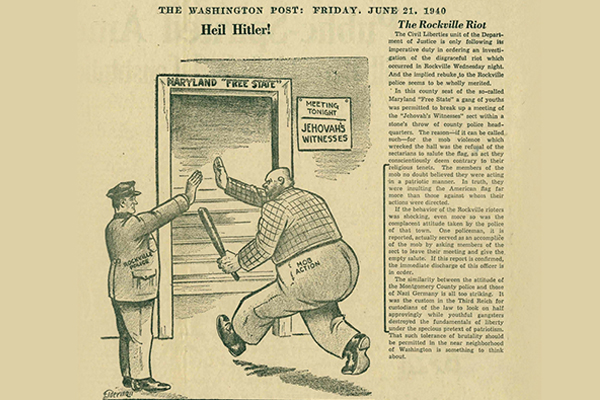
A Washington Post editorial cartoon condemned violence against Jehovah’s Witnesses in Rockville, Maryland, and drew comparisons with Nazi Germany. June 21, 1940.
After Adolf Hitler came to power in 1933, the Jehovah’s Witnesses were one of the first religious groups to be banned in Nazi Germany. Throughout the Nazi period, Jehovah’s Witnesses experienced intense persecution because of their unwillingness to participate in the military or demonstrate loyalty to the state (e.g. give the Hitler salute or join Nazi organizations).
Jehovah’s Witnesses in the United States also abstained from politics and war, which included saluting the flag and reciting the pledge of allegiance. In 1940, a US Supreme Court case upheld the compulsory flag salute in public schools. Three years later, the court overturned its previous decision in West Virginia State Board of Education v. Barnette. It was a profound victory for Jehovah’s Witnesses and helped to solidify First Amendment freedoms for all Americans. However, in the period between these two rulings, hundreds of children were expelled from public school for not participating in the flag salute and Jehovah’s Witnesses were the targets of violence and harassment.
This talk will explore the connections between the treatment of Jehovah’s Witnesses in Germany and the United States, particularly how people connected the two situations at the time. Dr. Rebecca Carter-Chand will discuss why this history matters to our broader understanding of the 1930s and 1940s as well as its transatlantic context. Her research focuses on Christian minority groups in Nazi Germany and their international networks during the 1930s and 1940s.
Dr. Carter-Chand is currently revising her dissertation, “The Salvation Army and the Limits of Christian Internationalism,” for publication. She is also co-editing a volume with Kevin Spicer, Christianity, Antisemitism, and Ethnonationalism in the Era of the Two World Wars (McGill-Queen’s University Press). Her first article was published in 2016, “The Politics of Being Apolitical: The Salvation Army and the Nazi Revolution” and her chapter “Christian Minority Churches, the Holocaust, and Resistance” will appear later this year in a volume on resistance to Nazism among small Christian churches in Germany.
Before coming to the Museum, Dr. Carter-Chand was visiting assistant professor at the Strassler Center for Holocaust and Genocide Studies at Clark University in Massachusetts, and a lecturer at Lakehead University, Orillia, and the University of Toronto. She received her PhD in History and the Collaborative Program in Jewish Studies at the University of Toronto in 2016.
Speaker
Rebecca Carter-Chand, PhD, Program Officer for Programs on Ethics, Religion, and the Holocaust at the United States Holocaust Memorial Museum's Jack, Joseph and Morton Mandel Center for Advanced Holocaust Studies
This program is made possible by the Campus Outreach Lecture Program of the United States Holocaust Memorial Museum's Jack, Joseph and Morton Mandel Center for Advanced Holocaust Studies, supported by the Anne and Harry Chinitz Campus Outreach Lecture Fund.
